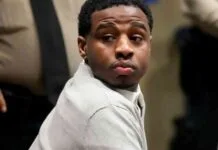Several seasoned lawyers were taken aback by the unprecedented testimony delivered by former Clark County Public Administrator Robert Telles during his murder trial. Telles took the witness stand and captivated jurors for approximately 90 minutes with a narrative-style monologue, devoid of any questions from his attorney, Robert Draskovich. This unconventional approach raised eyebrows and prompted discussions among legal experts about the ethical implications and strategic reasoning behind Telles’ testimony.
### Unprecedented Testimony
Former Clark County District Attorney David Roger, who now serves as the general counsel for the Las Vegas Police Protection Association, was initially startled when he caught a glimpse of Telles’ testimony on a muted screen during a meeting. The peculiar nature of Telles’ testimony prompted Roger to contemplate the underlying motives driving this unorthodox strategy.
Roger highlighted the ethical dilemma faced by attorneys when they suspect a witness may provide false testimony. According to the ethical rules governing legal practice, lawyers are prohibited from presenting evidence they know to be untrue. In such situations, one option available to attorneys is to inform the judge of the ethical concerns and allow the witness to share their narrative without the facilitation of leading questions.
### Ethical Considerations and Legal Strategies
Roger emphasized that allowing a witness to testify without the interference of questioning serves as a last-resort tactic, typically following unsuccessful attempts to dissuade the client from taking the stand. This approach, while unconventional, adheres to the principles outlined by the American Bar Association and underscores the delicate balance between legal representation and ethical integrity.
Stewart Bell, a former Clark County district attorney and district judge, offered a different perspective on Telles’ narrative testimony. Bell theorized that the decision to adopt this approach might have been motivated by a desire to streamline the process and expedite Telles’ storytelling. By eliminating the intermediary role of questioning, Telles could convey his account more efficiently, potentially saving time and resources in the courtroom.
While Bell acknowledged the rarity of witnessing such testimony in cases where the defendant is not self-representing, he acknowledged the uniqueness of Telles’ circumstances. Telles, a former probate lawyer, had previously opted to represent himself in the murder case, a choice that underscored his unconventional approach to legal proceedings and courtroom dynamics.
### Unconventional Legal Maneuvers
The murder case against Telles stems from allegations that he fatally stabbed investigative reporter Jeff German, who had written critical stories about him for the Las Vegas Review-Journal in September 2022. The legal saga surrounding German’s personal reporting devices further complicated the narrative, with disputes between officials and the publication culminating in considerations for a third-party search team led by individuals like Roger.
Christopher Oram, a veteran criminal defense attorney, echoed the sentiments of his peers regarding the uniqueness of Telles’ testimony. Oram emphasized that while Telles may have chosen to present his narrative uninterrupted, he would still be subject to rigorous cross-examination by the prosecution. Under scrutiny, Telles would be compelled to respond directly to inquiries rather than relying solely on a scripted monologue.
The unprecedented nature of Telles’ testimony has sparked debate within legal circles, with experts weighing the strategic implications and ethical considerations of this unorthodox approach. As the trial progresses, the spotlight remains on Telles’ narrative and its impact on the proceedings.
### Conclusion
In a legal landscape characterized by adherence to procedural norms and ethical standards, Robert Telles’ unconventional testimony has challenged traditional courtroom practices and sparked discussions among legal experts. As the trial continues, the implications of Telles’ narrative approach remain a focal point of scrutiny, highlighting the complex interplay between legal strategy, ethical considerations, and the pursuit of justice.






















